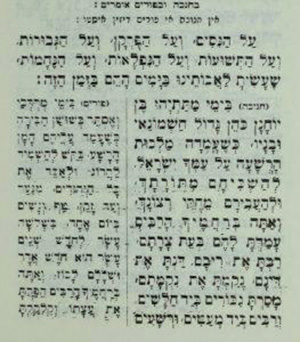


Leaving aside the inaccurate genesis of events and less-than-objective rendering, it is very interesting to see how some modern-day Greeks would like to view the events of Chanukkah.
It’s important to remember that Chanukah was not and is not an anti-Greek holiday. It is also interesting to note that some Greek Jews strategically replace any mention of “the Greeks” in the Chanukah liturgy with “the Syrians,” which is technically correct (as the persecutors were the Seleucid Kingdom of Syria). It also undoubtedly spares them a PR headache.
Professor Devin Naar, scion of Salonikan Sephardim and historian of Balkan Sephardic Jewry, writes:
Jewish leaders in Salonica published a new prayer book, Sha’are Tefilah, in March 1941. One of the pioneers in the field of the Sephardic studies in the United States, the Istanbul-born and Seattle-based writer Albert Adatto, acquired an exemplar of this rare book, thereby enabling us to access the long-lost world of Jewish Greece on the brink of destruction.
Remarkably, the editors of the prayer book—Salonican-born Jews who had been educated in Palestine—dedicated it to a Jewish soldier who had fallen on the battlefield defending “our beloved homeland, Greece.” Written not in Greek, but rather in Judeo-Spanish, the dedication aimed to show to Jews themselves that they ought to think of themselves not only as religiously Jewish and culturally Sephardi, but as Greek patriots, too. They believed that all of these allegiances could be held simultaneously.
The Al ha-nissim prayer from Siddur Sha’are Tefilah. It omits the standard reference to the “wicked Hellenic government.” (ST00348)
But in order to accommodate their Jewish and Greek identities, they made two noteworthy changes to the prayer book. In the Al ha-Nissim prayer added to the Chanukah liturgy that refers to the miracles associated with the holiday, the traditional reference to the “wicked Hellenic government” is quietly changed to the “wicked government.”
More remarkably, in Maoz Tzur (“Rock of Ages”), the popular Chanukah song, the reference to the enemy as Yevanim (“Greeks”) is replaced by Suriim (“Syrians”). The editors accomplished this clever switch by reference to the historical record. The Seleucids, the Hellenistic empire in control of Judea at the time of the Maccabees, were indeed culturally Greek, but they were geographically based in Syria. Hence the Salonican Jewish leaders could transform the “Syrians” into the Chanukah enemies and thereby more easily embrace Greece as their beloved homeland.
It is also interesting to note that in some versions of the Al Hanissim liturgy that came down to us from the Cairo Genizah, the formulation is interesting as it fails to characterize the “kingdom” as wicked (הרשעה) but merely has “the kingdom of Greece” (מלכות יון) (a similar version is found in Saadiah Gaon’s Prayer Book; see Jewish prayer texts from the Cairo Genizah).
The rabbis adopted a very nuanced attitude toward Hellenism throughout the Greco-Roman period. Many rabbis, beginning from the Mishnaic era, adopted Greek names, co-opted many Greek ideas and even praised the wisdom and beauty of the Greeks in their homiletic teachings.
I find it ironic that there are only two orthographically kosher languages in which one can write a Torah scroll according to the halacha: Ashurit (Assyrian script) and Greek. This is quite a remarkable thing; a Torah scroll written in ancient Paleo-Hebrew is invalid! (Perhaps there’s also an anti-Samaritan polemic hidden there.)
The early rabbinic writings have only tender things to say about Alexander the Great. You may be familiar with the famous story of the Jewish High Priest going to meet the mighty general as the latter planned an invasion of Judea (this appears both in the Talmud and in Josephus with slight variations). The province of Judea (Coele-Syria) switched hands several times after Alexander’s untimely demise. Whether under the Ptolemaic-Egyptians or the Seleucid-Syrians, there was little persecution under Alexander’s early generals/successors, and in fact, Antiochus III (father and predecessor of Antiochus Epiphanes, “the mad one”) was a very benevolent and tolerant ruler toward the Jews according to Josephus.
The story of Chanukah is about how some Jews fought some Hellenists.
In other words, Hellenism, per se, wasn’t the issue (as we see with previous and subsequent generations of Jews of all stripes becoming Hellenized to varying degrees). It was the intolerant policies of Antiochus Epiphanes that caused the revolt.
This passage from the Babylonian Talmud, Tractate Sotah 49b, perhaps best demonstrates the Jews’ millennia-old love-affair with Greece (although not without its detractors; see the entire passage).
אמר רבי בא”י לשון סורסי למה אלא אי לשון הקודש אי לשון יוונית
Rabbi Yehuda HaNasi said: In Eretz Yisrael, why should people speak the tongue of Syriac [Sursi], (the Aramaic commonly spoken in Eretz Yisrael)? Rather, they should speak either in the sacred tongue, Hebrew, or in (the beautiful tongue of) Greek.
~Rabbi Judah the Prince, born 135 CE, compiler of the Mishnah, the repository of Jewish Law.
Joel Davidi Weisberger is an independent researcher and translator. He runs Channeling Jewish History and can be reached at yoelswe@gmail.com.









